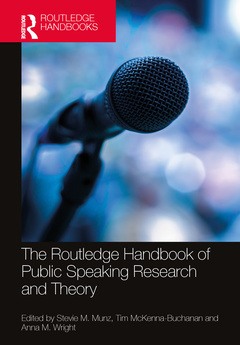The Routledge Handbook of Public Speaking Research and Theory Routledge Handbooks in Communication Studies Series
Coordonnateurs : Munz Stevie M., McKenna-Buchanan Tim, Wright Anna M.

Providing a comprehensive survey of the empirical research, theory, and history of public speaking, this handbook fills a crucial gap in public speaking pedagogy resources and provides a foundation for future research and pedagogical development.
Bringing together contributions from both up-and-coming and senior scholars in the field, this book offers a thorough examination of public speaking, guided by research across six key themes: the history of public speaking; the foundations of public speaking; issues of diversity, equity, and inclusion; considerations of public speaking across contexts; assessment of public speaking; and the future of public speaking in the twenty-first century. The evidence-based chapters engage with a broad discussion of public speaking through a variety of viewpoints to demonstrate how subtopics are connected and fraught with complexity. Contributors explore public speaking in education, business and professional settings, and political contexts, and outline how skills learned through public speaking are applicable to interpersonal, small group, and business interactions.
Reinforcing the relevance, importance, and significance of public speaking in individual, interpersonal, social, and cultural communication contexts, this accessibly written handbook will be an indispensable resource for public speaking instructors and program administrators. It will also be valuable reading for Communication Pedagogy and Introduction to Graduate Studies courses.
Introduction Part 1: Public Speaking as the Centrality of the Discipline 1. A Historical Tracing of Public Speaking Pedagogy 2. Canons of Rhetoric: Building Blocks for Speech Construction 3. Public Speaking and Theatre: A Joint Tradition 4. Public Speaking and Democratic Life: A Neo-Classical Rhetoric for the Digital Age 5. The Instruction of Public Speaking: An Index of Major Events in the Communication Discipline and Related Trends within the Literature Part 2: Foundations of Public Speaking 6. A Communication Traits Approach to the Teaching and Learning of Public Speaking 7. Ethical Concerns in Public Speaking 8. Listenability: The Art of Meaningful Public Speaking 9. Audience Analysis in Public Speaking: A Comprehensive Exploration 10. Rhetorical Audience Analysis and Reception Studies of Public Speaking 11. Approaches to Organizing and Outlining in Public Speaking 12. Delivery Modes, Elements, and Exceptions: Exploring and Troubling the Canon of Delivery in Public Speaking 13. Verbal and Nonverbal Communication: Creating Inclusion and Accessibility 14. A Clearer Picture: The History of Visual Aids in Public Speaking 15. Persuasive Public Speaking: Considerations for a Post-Truth Era 16. Exploring Speech Anxiety: Managing our Nerves to Share our Stories 17. Viva Lost Vagus: Yogic Breathing, Neuroscience, and Public Speaker Anxiety Part 3: Issues of Diversity, Equity, and Inclusion in Public Speaking 18. Relevant Today and Prepared for Tomorrow: Inclusion, Diversity, Equity, Access (IDEA) in Public Speaking 19. Accents and Dialects in Public Speaking 20. Critical Race Theory Interventions for Public Speaking 21. Whiteness and Public Speaking 22. Revisiting Public Speaking as a Liberal Art at Hispanic Serving Institutions 23. Accommodations in the Public Speaking Classroom for Students with Mental Health Conditions 24. Access and Accommodation and Public Speaking 25. Building Communication Competence through Public Speaking: Considerations for Faculty Outside of the Communication Discipline Part 4: Public Speaking Across Contexts 26. Public Speaking’s Transferable Skills for Industry 27. Public Speaking in Business and Professional Settings 28. Public Speaking in K-12 Contexts: Not Quite Uncharted Waters 29. Democratic Education through Public Speaking 30. Public Speaking in Action: Forensics as an Extended Classroom for Skills on Democratic Participation and Advocacy Part 5: Assessing Public Speaking 31. Measuring Student Learning in a College Level Public Speaking Class: The Development and Evolution of a Rubric 32. Assessment for Learning in Public Speaking Education: Best Practices for Design, Implementation, and Continuous Improvement 33. A Critical Systematic Review of Rubric Research in the Public Speaking Classroom Part 6: Public Speaking in the 21st Century 34. Speaking Soundly: Post-colonial Approaches for the Future of Public Speaking 35. Online Speaking: Adapting to the Virtual Environment 36. Online and Mediated Public Speaking 37. The Case for Online Public Speaking Skills in the Communication Curriculum 38. Digital Resources for Public Speaking 39. Where We Go from Here: Concluding Remarks
Stevie M. Munz is Associate Professor of Communication at Utah Valley University, USA.
Tim McKenna-Buchanan is Associate Professor of Communication Studies at Manchester University, USA.
Anna M. Wright is Instructional Assistant Professor at University of Illinois Urbana-Champaign, USA.
Date de parution : 04-2024
17.8x25.4 cm
Thèmes de The Routledge Handbook of Public Speaking Research and... :
Mots-clés :
public speaking; public discourse; debate; speech anxiety; speechwriting; oral communication; verbal communication; communication studie; speech pedagogy; digital media; audience analysis; business communication; professional communication; rhetoric; persuasive communication; diversity equity and inclusion



